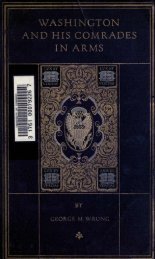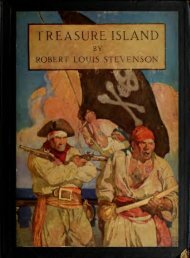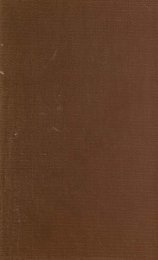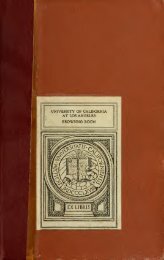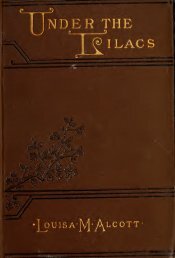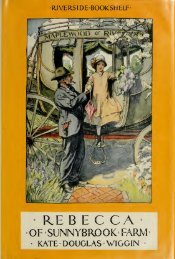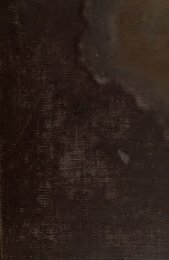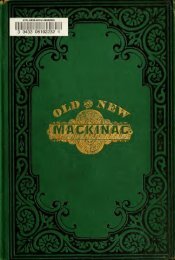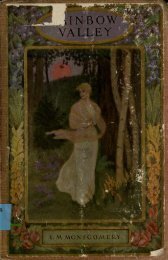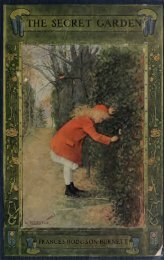- Page 7:
Alexander Henry'sTravels and Advent
- Page 13:
ClassicsAlexander Henry'sTravels an
- Page 16 and 17:
'prefacenity to earn high wages in
- Page 18 and 19:
'prefacetruce in a perpetual warfar
- Page 20 and 21:
Content^PAGE19. Return to Mackinac
- Page 23 and 24:
SJnttotiurtfottis the year of our L
- Page 25 and 26:
J^i^toricalhis boats being wrecked
- Page 27 and 28:
^ntrotwctionand paid one or more vi
- Page 29 and 30:
^ntrotiuctioncorrection in various
- Page 31 and 32:
Details aside, the most important a
- Page 33 and 34:
l^igtoricalas the desert of Sahara,
- Page 35:
TRAVELSAND ADVENTURESINCANADAANDTHE
- Page 39:
ToThe Right HonourableSIR JOSEPH BA
- Page 42 and 43:
prefaceIndians, nor any theory of t
- Page 45 and 46:
EMBARKING UPON THE FUR TRADEwhen th
- Page 47 and 48:
anti3ltibcnturcAt this time, having
- Page 49 and 50:
only so much clothing as I had fort
- Page 51 and 52:
anfchad made his discovery, recomme
- Page 53 and 54:
Crafcrig antithe atmosphere grown m
- Page 55 and 56:
anfrhe uniformly fulfilled with hon
- Page 57 and 58:
THE VOYAGE TO MACKINACinland naviga
- Page 61 and 62:
ant!described will sufficiently exp
- Page 63 and 64:
Cratoelg an&and pursued our course
- Page 65 and 66:
anfcwide, and which falls into the
- Page 67 and 68:
anfcAt twelve miles from the second
- Page 69 and 70:
anfcseveral families upon whom they
- Page 71 and 72:
auto&tifccntureOn the morning of th
- Page 73 and 74:
Chapter 3ARRIVAL AT MACEJNACOUR cou
- Page 75 and 76:
an&assistance of an Indian we took
- Page 77 and 78:
anfcmouth of the river a meadow, ca
- Page 79 and 80:
antientered and assimilating myself
- Page 81 and 82:
anfc3ttitoenturewhich we passed the
- Page 83 and 84:
Chapter 4RECEPTION AT MACKINACEAVIN
- Page 85 and 86:
anfcand from Montreal. Michilimacki
- Page 87 and 88:
had in his countenance an indescrib
- Page 89 and 90:
anti"Englishman, your king has neve
- Page 91 and 92:
Cratoelg attfcthem into Lake Michig
- Page 93 and 94:
atifcin this country, and of your h
- Page 95 and 96:
atoelganfcEarly the next morning a
- Page 97 and 98:
Cratoelg anti&&toetttitrethe St. Jo
- Page 99 and 100:
anfcThe sociable disposition of the
- Page 101 and 102:
antithe ice by the end of a pole. A
- Page 103 and 104:
A VISIT TO SAULT STE. MARIEdesirous
- Page 105 and 106:
Cratoelg anbwhich are found here du
- Page 107 and 108:
DESTRUCTION OF THE FORT AND RETURN
- Page 109 and 110:
anfcThe commandant and all the rest
- Page 111 and 112:
Cratoelg anb 2tiitocnturchere to ou
- Page 113 and 114:
anfcThe lands between the Bay of Bo
- Page 115 and 116:
ant*there till after my clerks shou
- Page 117 and 118:
Crafcelg and&Dtornturc$four in numb
- Page 119 and 120:
antihe had just returned from his w
- Page 121 and 122:
antiments, of which I had a large q
- Page 123 and 124:
anfcthere being a canoe prepared to
- Page 125 and 126:
antithere was only a low fence, ove
- Page 127 and 128:
anfcwere in the house. M. Langlade
- Page 129 and 130:
and &&toenturegtaken, they returned
- Page 131 and 132:
Cratoelg anti&trtmtturcis?upon as m
- Page 133 and 134:
anfcfears on this subject to M. Lan
- Page 135 and 136:
antitobenturc$his grasp. This was n
- Page 137 and 138:
morning, being again called down, I
- Page 139 and 140:
THE JOURNEY TO BEAVER ISLANDF | ^HE
- Page 141 and 142:
anfcpurpose of saving our lives, th
- Page 143 and 144:
attfcI was left untied; but I passe
- Page 145 and 146:
12RESCUED BY WAWATAMAT hour elapsed
- Page 147 and 148:
Cratoelg anfcand the consequences w
- Page 149 and 150:
anfcAfter an absence of about half
- Page 151 and 152:
Cljaptct; 13THE ADVENTURE OF THE BO
- Page 153 and 154:
All the Indian canoes were immediat
- Page 155 and 156:
Cratodg anfcsound of a foot reached
- Page 157 and 158:
A FEW.chapter,mTHE ARTS OF THE MEDI
- Page 159 and 160:
anfcwas all that I seemed destined
- Page 161 and 162:
anfcthe ground, and inhaling the ni
- Page 163 and 164:
anUUpon its disappearance he began
- Page 165 and 166:
antibreath escape, and from which a
- Page 167 and 168:
Chapter isREMOVAL TO THE AU SABLEOU
- Page 169 and 170:
antito which we were bound. They ar
- Page 171 and 172:
in procuring food. At two years old
- Page 173 and 174:
antiSlfctoenturegraccoon he gives n
- Page 175 and 176:
atifcThe master of the family was t
- Page 177 and 178:
antitracks of animals in momentary
- Page 179 and 180:
attfcgun and ammunition, and was th
- Page 181 and 182:
Chapter 17A BEAR HUNTfTAHE sun was
- Page 183 and 184:
anfr%frtenturcgdown. This day's wor
- Page 185 and 186:
Crabclg anfr%frbenturcgremaining th
- Page 187 and 188:
Chapter isDEATH OF A CHILDOUR venis
- Page 189 and 190:
andit remained till we went to the
- Page 191 and 192:
isRETURN TO MACKINACwe remained on
- Page 193 and 194:
anfcthe satisfaction of learning th
- Page 195 and 196:
Crafccitf att& tiftcnturrIndians to
- Page 197 and 198:
20FLIGHT TO THE SAULTUNABLE, theref
- Page 199 and 200:
anfr%frfrcnturegnation; and she was
- Page 201 and 202:
anfr%frfrenturegfrom Michilimackina
- Page 203 and 204:
antihis ambassador, and tellyou tha
- Page 205 and 206:
Chapter 21INVOKING THE GREAT TURTLE
- Page 207 and 208:
anfcwere heard, in which a diversit
- Page 209 and 210:
anfcand every man will return in sa
- Page 211 and 212:
Chapter 22VOYAGE TO FORT NIAGARAthe
- Page 213 and 214:
antialong the ground in visible goo
- Page 215 and 216:
design to put him to death. He assu
- Page 217 and 218:
andand encamped, in the evening, fo
- Page 219 and 220:
Crafcdg anfcarriving at Detroit, to
- Page 221 and 222:
Cratoelg anfcmilitary discipline ac
- Page 223 and 224:
anfcOn the day following that of th
- Page 225:
PART TWO.LAKE SUPERIOR AND THE CANA
- Page 228 and 229:
J^cnrpat six shillings each; marten
- Page 230 and 231:
&lejtanberwound which he received f
- Page 232 and 233:
clothing left among them. Under the
- Page 234 and 235:
'The Chippewa of Chagouemig are a h
- Page 236 and 237:
9its former possessors ;but it is n
- Page 238 and 239:
lake. On his receiving my consent,
- Page 240 and 241:
hundred strong and that on the four
- Page 242 and 243:
IFAMINE AT THE SAULTPASSED the wint
- Page 244 and 245:
crime of which he was accused. From
- Page 246 and 247:
meal 'sprovision for each person. H
- Page 248 and 249:
Great Hare are as varied as his nam
- Page 250 and 251:
Siejcanbernation I have already had
- Page 252 and 253:
the quantity of water everywhere ex
- Page 254 and 255: left naked, and the birds had fled
- Page 256 and 257: first evening, reckoning upon a pro
- Page 258 and 259: At night we reached the Sault. Our
- Page 260 and 261: Jjjenrpblown upon the former by a s
- Page 262 and 263: same time laying the keel of a sloo
- Page 264 and 265: .Ahave been produced by the damming
- Page 266 and 267: eached in eighteen hours, with a fa
- Page 268 and 269: which to the last had daily present
- Page 270 and 271: dint of labor performed between the
- Page 272 and 273: &iejcantierlying between Lake Super
- Page 274 and 275: almost entirely of rock. The larges
- Page 276 and 277: principally in birch, pine, spruce,
- Page 278 and 279: SUcjranfcerJ^enrpChippewa of fifty
- Page 280 and 281: are not large enough to carry provi
- Page 282 and 283: I^enrpof the Winipegon are still fu
- Page 284 and 285: above the ear; and this roll, like
- Page 286 and 287: another dialect of the same. In the
- Page 288 and 289: severe gale, from the dangers of wh
- Page 290 and 291: twenty-fifth, by which time the sma
- Page 292 and 293: there was in the French time a fort
- Page 294 and 295: that if we passed now he could put
- Page 296 and 297: landers from the Orkney Islands, an
- Page 298 and 299: was frozen over. Happily we were no
- Page 300 and 301: aicranbcrmercury contracted one-eig
- Page 302 and 303: fashion. Our clothing for night and
- Page 306 and 307: chocolate would keep us alive for f
- Page 308 and 309: This day, the twenty-fifth, we foun
- Page 310 and 311: The Plains cross the River Pasquaya
- Page 312 and 313: Chapter nA JOURNEY ON THE PLAINSdep
- Page 314 and 315: left our encampment at an early hou
- Page 316 and 317: the great chief of the nation, whos
- Page 318 and 319: mile and a half long. Shortly after
- Page 320 and 321: followed him accordingly, and he ca
- Page 322 and 323: that of the Indians in general. His
- Page 324 and 325: custom of the Indians, who say that
- Page 326 and 327: lljenrpthe dried meat and skins of
- Page 328 and 329: INChapter 13CUSTOMS OF THE RED MENt
- Page 330 and 331: ack by shaking skins before their e
- Page 332 and 333: Pasquayah, or Sasca,tchiwaine, and
- Page 334 and 335: Many travelers have described the m
- Page 336 and 337: SUejtanberispoured upon a red-hot s
- Page 338 and 339: inventory of what is supposed to be
- Page 340 and 341: principal chiefs, whose tent was ne
- Page 342 and 343: Chapter 14THE RETURN TO FORT DES PR
- Page 344 and 345: tents. We were not long arrived bef
- Page 346 and 347: that important utensil, the kettle.
- Page 348 and 349: A stroud blanket10 beaver skinsA wh
- Page 350 and 351: quantity of fish diminished, insomu
- Page 352 and 353: threegood health and had built a ho
- Page 354 and 355:
Nothing human had hitherto discover
- Page 356 and 357:
to enter our house during all the n
- Page 358 and 359:
The women were dirty,these people o
- Page 360 and 361:
By means of these commodities many
- Page 362 and 363:
t)cnrpwere lately from the Grand Po
- Page 365 and 366:
ABITIBI Lake, route by, 228.Abitibi
- Page 367 and 368:
Boutchitaouy Bay, arm of Lake Huron
- Page 369 and 370:
Cocking, Matthew, explorations of,
- Page 371 and 372:
Frobisher, Benjamin, memorial on No
- Page 373 and 374:
life, 129; lost, 132-37; bear hunt,
- Page 375 and 376:
Les Cedres, Henry visits, n.Leslie,
- Page 377 and 378:
Mosquitoes, on Matawan River, 29; a
- Page 379 and 380:
Plains, of Saskatchewan, extent, 25
- Page 381 and 382:
Saskatchewan (Bourbon, Pasquayah) R
- Page 383 and 384:
Venison, method of drying, 132; qua
- Page 392 and 393:
..I 1 ',&.



